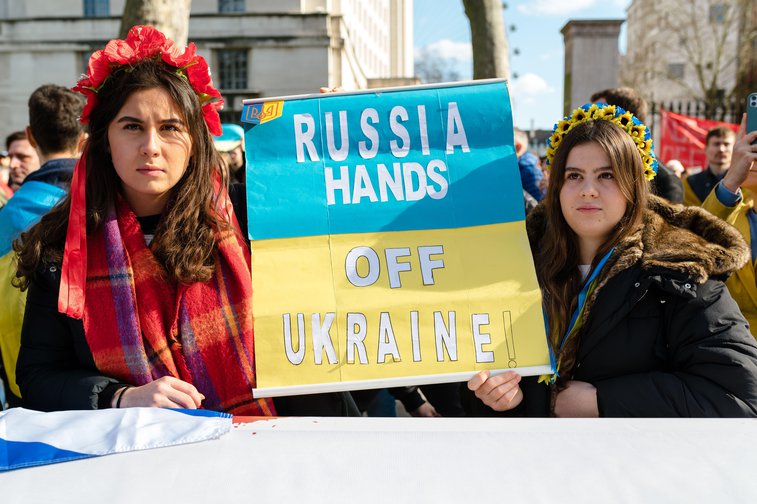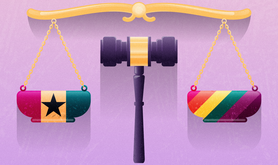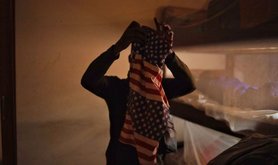
How Russian feminists are opposing the war on Ukraine
Feminist activists formed Russia’s first anti-war movement. Now, to prevent catastrophe in Ukraine, we must stand up to those stuck in the past


I was raised by my grandparents in a small city in Moscow province. I called my grandmother ‘mom’ for as long as I can remember. Ten years ago, I was abroad on a summer study trip when she died suddenly. My relatives decided not to tell me so that I could finish my studies in peace. But, of course, from their silence, I deduced that something terrible had happened at home. I was so paralysed with fear that I didn't even ask. I waited for the end of my studies in appalling oblivion.
When I returned, my grandmother was already buried. I never saw her body and for a long time couldn’t believe that she was no more. She just disappeared, and it seemed to me that at any moment she would appear again. It took me years to realise that she was really gone. I also had to cope with agoraphobia, and begin to get out of the house and travel again.
The death of my grandmother completely changed my life, but also made me who I am today. It made me a feminist activist, as I wanted to do something that would restore harmony and meaning to the world that I had lost. It made me a scholar, as I wanted to better understand those who had been like parents to me.
Now I am in London. Since October, I have been writing a thesis on the gender history of the USSR at University College London (UCL). I am studying the lives of girls and young women who were raised in the Cold War-era Soviet Union – women like my grandmother. It took me a long time to gain the courage to leave for another country, and I did it only when I had no prospects left in Russia.
In recent years, feminism in Russian society has been developing and growing, as has interest in gender studies in general. But this development has taken place in spite of the state and the authorities, who persecute anyone who doesn’t toe the party line.
‘Through a glass, darkly’
Four months after I left Russia, something terrible has again happened at home, and on a much more monstrous scale. The government that I never elected and had opposed all my adult life has attacked its neighbour, Ukraine, without declaring war. The country where I have relatives and friends, which I have visited numerous times, is now burning.
Russian soldiers are killing civilians and destroying entire cities in Ukraine, and I am far away again and see it all “through a glass, darkly”. I get a terrible feeling of déjà vu and despair from the news – but also from seeing how everything repeats itself and becomes only scarier.
The most terrifying part is the feeling that it isn’t just my own past repeating itself, but that the whole traumatic history of Eastern Europe is turning into some kind of ouroboros – a giant snake eating its own tail. When I read about the hundreds of thousands of people leaving Ukraine, I remember the story of my grandfather, who was from a Jewish family in Ukraine and had to flee Kharkiv in 1941 when it was occupied by the Nazis.
He was a six-year-old boy, and both his parents were serving on the front line (his father as a soldier, his mother as a surgeon). He left by train with his grandmother, Berta, for the city of Berezniki in the Perm Krai region of Russia. Berta was so old that my grandfather thought she would not survive the weeks-long trip. My grandfather had a name tag on his clothes with information about relatives in Siberia in case he was found alone.
Now the gears of history are turning in the opposite direction. As a historian, I understand that I can’t draw loose historical analogies or simply say that history repeats itself. But I can talk about how one trauma leads to another, how the memory of suffering or resentment creates new disasters.
History is alive for Putin, who still thinks of Russia as an empire or a superpower, and not just a country
In Vladimir Putin’s speeches and state propaganda, the war in Ukraine is justified by a web of references to the Second World War, the Cold War and certain ‘traditions’ that have become an important part of Russia’s historical culture and public mythology. History is alive for Putin, as well as for his circle and many other Russians, who still think of Russia as an empire or a superpower, and not just a country.
As a result of this, civilians are fleeing Kharkiv again, just as they did 81 years ago. But now the occupiers are the Russian soldiers. They have already come up with their own version of the swastika: the Russian military, and the regime’s propaganda, are using the letter ‘Z’ as a symbol of victory over Ukraine.
This symbol has been daubed on the doors of anti-war activists in Russia, who are on the streets every day protesting against their country’s invasion of Ukraine. The police painted the same symbol on the Moscow office of the Memorial human rights organisation during a raid a few days ago. The letter ‘Z’ has become a symbol of terror, repression and censorship in Russia, and a sign of war and occupation in Ukraine.
Stop the vicious circle
The only thing that gives me hope today is that there are thousands of people who want to stop this endless repetition of Eastern Europe’s past and think about its future. These people are historians and social scholars, intellectuals, human rights defenders, activists and members of civil society.
They include feminist activists, who became the first group to create an anti-war movement in Russia following the invasion of Ukraine – the Feminist Anti-War Resistance that I am happy to be part of. Our manifesto has already been translated into 14 languages. Feminists from all over Russia, as well as from the UK, Italy, Switzerland and other countries, have taken to the streets in protest using our symbols.
I believe that if we unite our forces and intellectual abilities, we will be able to stop the vicious circle, end this war and find a way to take a fresh look at the future of Russia and other countries in the region. For this, we need solidarity between the anti-war movements inside and outside of Russia.
It’s important not to separate all Russians from the rest of the world: it will just lead to the weakening of opposition inside Russia, and its total destruction by Putin’s regime. Unfortunately, this regime cares neither about the lives of the Ukrainian people nor about the lives of Russians, whom Putin’s people are ready to kill (like Alexey Navalny) or torture (like feminists in the police station two days ago) for any kind of protest.
I believe that uniting anti-war forces inside and outside of Russia now is the only way to stop a voracious ouroboros that devours more and more people. For me, personally, building this kind of solidarity will be one of my goals from now on.
Read more
Get our weekly email




Comments
We encourage anyone to comment, please consult the oD commenting guidelines if you have any questions.